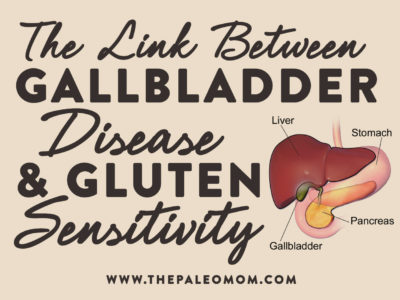One of the challenges that I face personally with my health is something called the Gut-Brain Connection (or sometimes called the Gut-Brain Axis). Basically, brain health affects gut health affects brain health affects gut health. It’s an idea that has been around in the scientific literature for decades (at least seven of them!), but has yet to pervade medical practice (like so many nutrition-related health issues). I have been really interested in this topic for a while now and I thought it was time that I shared some of this information with you. I know this is A LOT of information, so please feel free to comment with any questions (or skip to the salient points, which are italicized or bolded).
The entire gut is lined by an extensive network of neurons embedded directly into the walls of our esophagus, stomach, intestines, rectum and colon. This is called the enteric nervous system, which consists of more neurons than in either the spinal cord or the peripheral nervous system. This network of neurons is so extensive, that it has been coined the “Second Brain”. It has the very important job regulating all the various aspects of digestion, from breaking down food, to absorbing nutrients, to expelling waste.
It may not be surprising that the brain has a direct effect on the digestive system. For example, thinking about food can release digestive enzymes into the stomach before you even eat. If you’re nervous or stressed, your stomach may feel upset. But how does this work?
- Your brain sends signals to all of the nerves in your body. These signals are essential for everything from breathing to moving your legs so you can walk. A very large portion of your brain’s output is directed into the vagus nerve, the nerve which innervates (which means branches into the nerves controlling) most of the thoracic (chest) and abdominal cavities. The vagus nerve thus controls a wide variety of functions, from your heart beating, to the secretion of digestive enzymes, to the peristalsis of your intestines. The important part here though, is that the vagus nerve innervates the digestive tract.
- Stress, anxiety, depression and strong negative emotions decrease your brain activity, which decreases activation of the vagus nerve. This will reduce pancreatic enzyme secretion and cause poor gallbladder function, thereby reducing stomach acid production, as well as decrease gut motility, decrease intestinal blood flow, and suppress the intestinal immune system.
- When this reduced vagus nerve activation is persistent, the slowing down of so many digestive functions results in something called Small Intestinal Bacterial Overgrowth (SIBO), an increased growth of pathogenic yeast and bacteria in the gut (specifically the small intestine, the longest section of our intestine responsible for nearly all digestion). These are not the beneficial bacteria that we are supposed to have lower down in our digestive tract.
- These “bad” yeast and bacteria (which are also too high up) contribute to an increase in intestinal permeability (a.k.a. leaky gut) beyond what is already caused by the lectins and saponins in dietary grains and legumes. Even in the absence of dietary grains and legumes, SIBO can cause a sufficiently leaky gut to produce systemic, chronic low grade inflammation. This effect of the brain on the gut is why people who suffer depression so often also have constipation or suffer from Irritable Bowel Syndrome.
I know this is dense, but the basic point is that stress, anxiety, and depression result in a leaky gut.
What you might not already know is that the gut has a direct effect on the brain. A troubled intestine can send signals to the brain, just as a troubled brain can send signals to the gut.
- Actually, about 90 percent of the fibers in the vagus nerve carry information from the gut to the brain and not the other way around. There is scientific evidence to suggest that the gut can communicate directly with the brain, perhaps having a direct impact on emotions and moods via the nervous system.
- Better understood though, are the chemical signals that are sent to the brain from the irritated/damaged gut. When the gut becomes leaky and inflamed, the inflammatory cytokines (chemical signals of inflammation) that are produced in the gut travel through the blood to the brain.
- These inflammatory cytokines cross the blood-brain barrier and activate the resident immune cells of your brain, the microglial cells. Yes, this is exactly what it sounds like: a leaky gut causes body-wide inflammation, including inflammation in the brain.
Now, for the vicious circle part: an inflamed brain has decreased nerve conductance which manifests as stress, depression and/or anxiety.
What Should You Eat To Heal a Leaky Gut? for more information.












